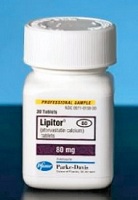Merck & Co.'s ($MRK) cholesterol drug Zetia had another day in the spotlight on Monday. An FDA advisory panel is debating results from an outcomes trial, Improve-It, and whether they're strong enough to give Zetia a bigger role in cholesterol-fighting treatment.
That would include a new indication as an add-on to a variety of statin meds. It could be a needed boost for Zetia, which is also part of Merck's combo cholesterol pill Vytorin. The latter pairs Zetia with the now-off-patent statin Zocor (simvastatin), and the sister products have delivered lackluster sales in recent years, as more blockbuster statin meds fell off patent and questions arose about the utility of Zetia as an add-on.
Improve-It appears to have put those questions to rest. The long-term cardiovascular outcomes trial showed that adding Zetia to simvastatin not only cut levels of "bad" LDL cholesterol, but significantly cut the number of heart attacks, strokes, and other CV "events" that together made up its primary goal.
FDA reviewers laid out the Improve-It results--among 18,144 patients with acute coronary syndrome, CV events in the simvastatin arm ran to 30.2% of patients, while 28.4% of patients in the Zetia-plus-simvastatin suffered from one or more. They also noted that 50 people would need to take Zetia as a simvastatin add-on for 7 years to prevent one of the CV events included in the primary endpoint, CardioBrief notes.
And as CardioBrief reports, the FDA panel debate is likely to center on a couple of issues--data that's missing from the calculations, and analyses of subgroups of patients, which could affect how the agency styles any new use for the drug.
The overall label for both Zetia and Vytorin could get a boost with language saying that they're approved to reduce cardiovascular events--including heart attack, stroke and cardiovascular death--in patients with heart disease. Right now, as CardioBrief notes, statins are the only cholesterol meds labeled this way.
 Merck is also asking for a new indication on Zetia allowing it as an add-on to statin meds aside of simvastatin. That would allow the company to market Zetia more broadly, because millions of patients on statins use other meds such as the Pfizer ($PFE) giant Lipitor, which is now available as a generic.
Merck is also asking for a new indication on Zetia allowing it as an add-on to statin meds aside of simvastatin. That would allow the company to market Zetia more broadly, because millions of patients on statins use other meds such as the Pfizer ($PFE) giant Lipitor, which is now available as a generic.
But as CardioBrief notes, the beneficial effects of Zetia in the Improve-It trial "occurred almost exclusively in trial patients who had diabetes." Patients 75 years and older were also big beneficiaries compared with other age groups.
At least one panelist at today's meeting--Dr. Sanjay Kaul, the outspoken cardiologist--has said that a new Zetia use might be limited. "Given these results, it would be difficult to support its use in non-diabetics," Kaul said at the European Society of Cardiology meeting earlier this year (as quoted by CardioBrief). And an FDA reviewer made a point of noting "no effect seen among the under 75, non-diabetic subgroup, which were a majority of the study population."
We'll know soon how the panel votes, and after that, it will be up to the FDA to determine whether--and how--to revamp Zetia's target market. Analysts tend to think Merck will get a broader label out of the data. They also think that the Improve-It results help support the case for PCSK9 drugs recently launched by Sanofi and Regeneron (Praluent) and Amgen (Repatha). Those meds, approved as add-ons to statin therapy, have proven they can cut LDL dramatically, but their outcomes trials won't wrap up for more than a year.
The PCSK9 meds also offer another kind of help to Zetia. Some payers are requiring patients to try the Merck med before moving on to the much-more-expensive PCSK9s, which carry list prices of more than $14,000 per year.
- see the CardioBrief story
Special Report: Top 15 pharma companies by 2014 revenue - Merck & Co.